Take a seat: MillerKnoll’s Joel Olive discusses career path with Wayne State University design students
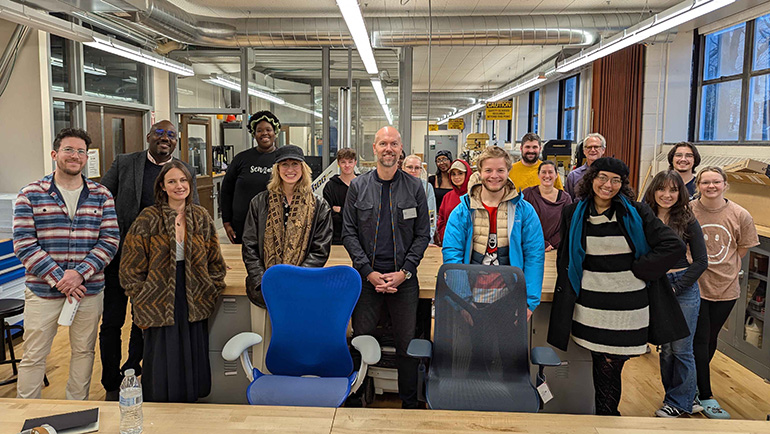
When Joel Olive was in college, he felt he sometimes didn’t have opportunities to ask meaningful questions about careers.
That’s why Olive — now seating portfolio lead at office furniture, equipment and home furnishings manufacturer MillerKnoll — met with Wayne State University design students in the James Pearson Duffy Department of Art, Art History, and Design on Nov. 21, 2024 — to be the person he didn’t have access to as a student.
And while Olive admitted to the roomful of Warriors that he isn’t a designer by trade, he said he constantly uses his problem-solving and technical background to help inform the design process.
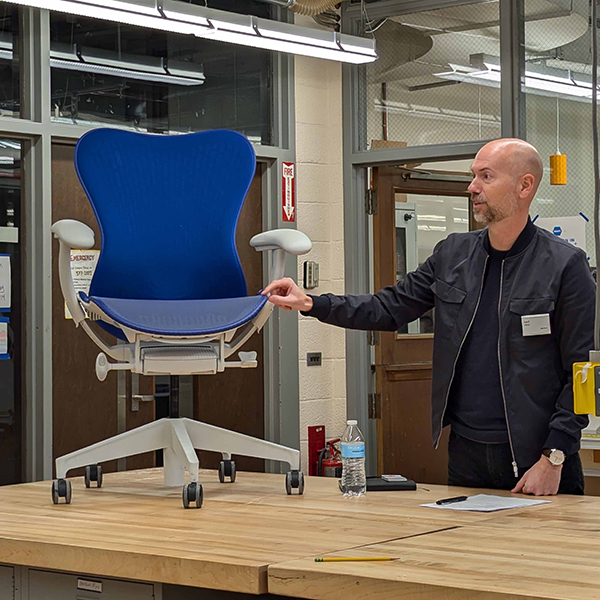
“I'm not the one designing it,” Olive said to the students. “And I wouldn't pretend to have that creative part in my brain, as active as you all, but I can talk intelligently to a designer about: ‘Hey, have you thought about how the tooling of this mold flow is going to be critical? If I want it to be beautiful but rigid, how do I dematerialize it?’ I also think about how I'm going to hide these bolts in the chair so it can be an elegant design. One of the things about MillerKnoll is they do an amazing job of marrying functionality with elegant design.”
MillerKnoll is best known for designs such as the Aeron chair, Noguchi table, Marshmallow sofa, Mirra chair and the Eames lounge chair. During his meeting with students, Olive discussed his journey to MillerKnoll and how the company’s chairs — such as the Mirra 2 and Cosm that he brought with him — go from concept to offices around the globe. Olive also talked about sustainability and materiality, ergonomics, and the product development process.
The session concluded with a Q&A, where Olive addressed students’ questions on topics ranging from inclusive design and the assembly processes to the balance between innovation and cost.
“Design in Detroit is more than just aesthetics; it’s a reflection of the city’s resilience, innovation and industrial heritage. That's why we are proud to partner with MillerKnoll,” said Hasan Elahi, dean of the College of Fine, Performing and Communication Arts. “It's about reimagining the future while honoring the past, and seeing our students blend creativity with craftsmanship to shape products that inspire and drive economic growth.”
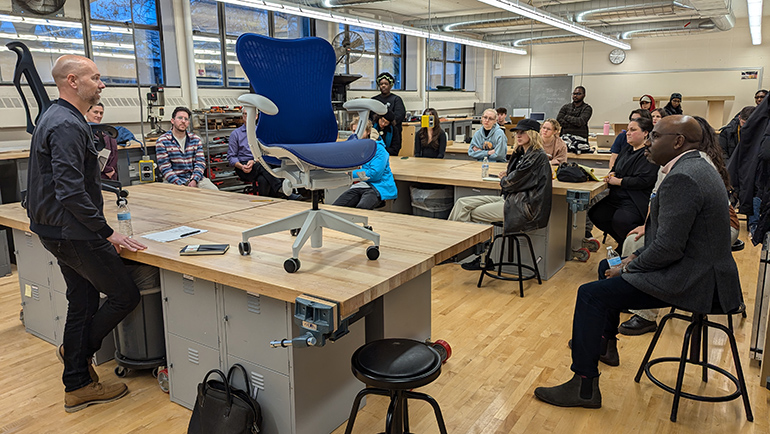
Growing up in Michigan, Olive said he always wanted to get into engineering. His grandparents worked for an automotive company, so he figured he’d design cars.
“Actually, I have a physics degree in undergrad, with the intent of always going into a master of engineering because I wanted to work in automotive. I wanted to design art that was cool,” Olive said. “But no one informed me that when you go into automotive in an entry-level position out of college, even if you have a master’s, you're not designing anything.”
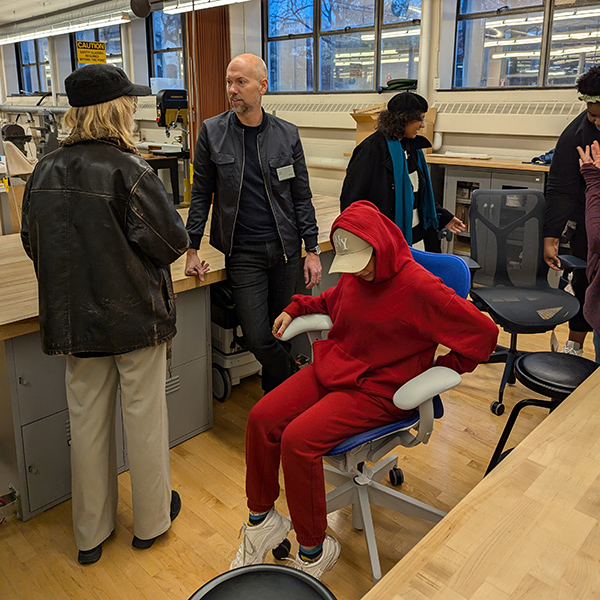
Upon completion of his master's of mechanical engineering, Olive worked for Toyota and traveled the world, doing a lot of new car development. While he still, technically, wasn’t designing anything, he helped build and design processes to assemble bits and pieces that went into the car. It was his first exposure to global business and culture.
“I really enjoyed all of that. And what that ingrained in me was Toyota's world-class manufacturing, problem-solving and anything lean. I learned that it doesn't have to be only for manufacturing processes,” Olive said. “You can be smart and intentional and just in time or only use the exact materials you need through design or prototyping or development, or for processes that are only on paper or digital. It doesn't only have to be manufacturing, even though that's what they're known for, but that was ingrained in me through that job.”
But Olive, who was born and raised in Lapeer, Michigan, eventually wanted to stop traveling and working 80 hours a week. That’s when he got a job at MillerKnoll, then known as Herman Miller, and settled down near the company’s Zeeland, Michigan, headquarters.
He began doing product development, in the same vein as his work for Toyota, setting up new manufacturing processes. “Things such as ‘Where are we going to make this part and that part, and how and where I'm going to build and then assemble all the 75 parts that go into this chair?’” he said. “You can see that connection between automotive.”
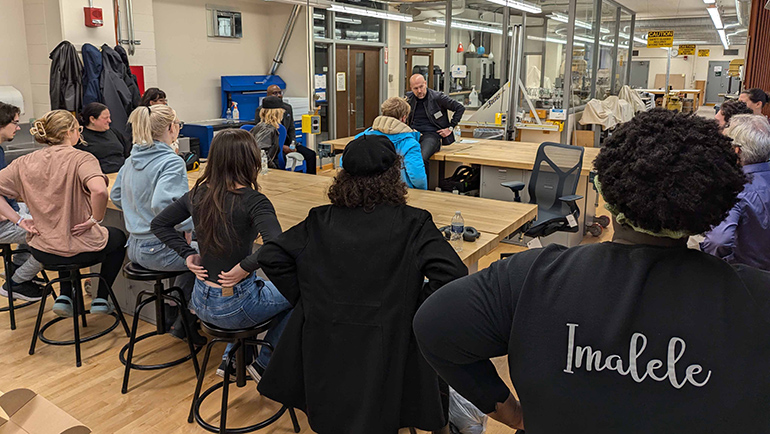
Praise Imalele, a third-year WSU interior design major, was one of the students who attended Olive’s session. She was inspired to attend by her sister's previous internship at MillerKnoll, and hopes to potentially pursue a similar opportunity.
“I was impressed by the design process and manufacturing insights, as well as the opportunity to try the chairs,” Imalele said. “And although I had not previously considered chair design, this experience has sparked my interest. It was beyond my expectation.”
Brian Kritzman, an associate professor in the James Pearson Duffy Department of Art, Art History, and Design, and head of its industrial design program, extolled the value of having industry experts such as Olive speak with students.
“While university education provides a foundation, real-world knowledge and problem-solving skills are crucial and often acquired post-graduation. That’s why it’s also important to learn from professionals who have diverse career paths, like Joel's transition from automotive to industrial design,” Kritzman said. “We hope to continue such industry interactions, especially since we know the significant impact on students' practical education and problem-solving abilities within the field of design.”
Story and photos by Shawn Wright, Communications Officer for the College of Fine, Performing and Communication Arts.